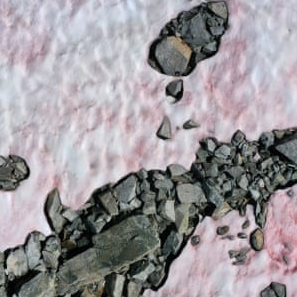


Pink
snow, also called "watermelon snow," has appeared at Northern Italy's
Presena glacier, according to Biagio Di Mauro of the Institute of Polar
Sciences at Italy's National Research Council. While it's not uncommon for the
Italian Alps to be "pretty in pink" in spring and summer, scientists
become cautious when the phenomenon, which is caused by algae, starts happening
more frequently.
Biagio
Di Mauro, of the Institute of Polar Sciences (ISP) at Italy's National Research
Council, traveled to the glacier last week to investigate the mysterious algae.
While the phenomenon is well-documented, "there is relatively little
scientific literature on this phenomenon, which has the direct effect of
accelerating the melting of snow and ice," the institute said. The
algae could accelerate melting in the already fragile region. Climate change, contributing to 2020's unseasonably warm
temperatures and lack of snow, is exacerbating the issue.
Typically, ice reflects the majority of the sun's radiation, but
algae darken the ice, causing a decrease in albedo, or reflectivity. This causes
the snow to absorb more heat and melt more quickly. "Everything that
darkens the snow causes it to melt because it accelerates the absorption of
radiation," said Di Mauro. In order to
flourish, the organisms need an available supply of water. So, as the ice
melts, even more algae will appear.
The
concern is that the algal bloom on the snow will accelerate the effects of the
climate crisis. As Agence France-Presse (AFP) reported the plant, known as Ancylonema
nordenskioeldii, is often found in Greenland's so-called Dark Zone,
where the ice is also melting.
"A
classic reminder of how uncertainty is not our friend," said Dr. Michael
E. Mann, a distinguished professor of atmospheric science at Penn State
University, to Salon by email. "In this case, we're seeing an amplifying
feedback wherein biological darkening (due to Algae growing on the surface of
melting ice), leads to more solar absorption by the ice and even faster
melting. We call this a 'positive feedback' but it is anything but positive. It
reflects a process which is leading to faster melting of the glaciers than our
simple models predict."
Scientists
are now trying to understand how the melting of ice at such unexplored regions
and for reasons yet undiscovered is having an impact on global sea level rise.
A recent study in this regard measures the ice melt from below the ice shelves
of Antarctica.

To volunteer for small initiative in protecting mother earth please participate here.
Thank You !